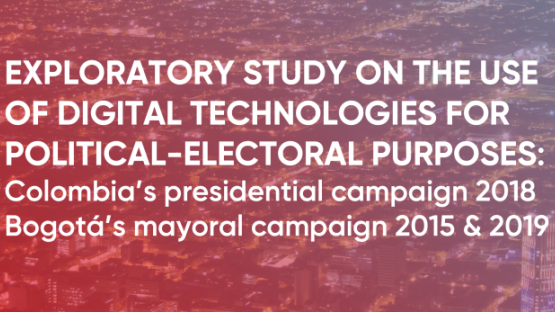
The use of digital technologies in political campaigning in Colombia
PI partner Dejusticia’s latest research tackles the use of micro-targeting in the 2018 Colombian presidential campaign and the 2015 and 2019 Bogotá mayoral campaigns.

Democratic engagement is increasingly mediated by digital technology, from campaigning to election results transmission. A key example of the application of new technologies to democratic processes is the growing practice of micro-targeting in political campaigning around the globe, including Colombia.
In 2018, the mayor of Bogotá, Enrique Peñalosa, was accused of hiring Cambridge Analytica during his 2015 election campaign. That same year, Cambridge Analytica’s former director acknowledged interacting with three presidential campaigns in the 2018 Colombian presidential race.
In response to the concerns arising from these potential collaborations, Dejusticia explored the use of micro-targeting for political campaigning purposes specifically in the 2018 Colombia presidential campaign and the 2015 and 2019 Bogotá mayoral campaigns.
The resulting report was authored by Daniel Ospina Celis and Juan Carlos Upegui of Dejusticia, in collaboration with Privacy International.
Key findings
- In Colombia, owing to features of the political advertising industry, the use of sophisticated digital technologies for electoral purposes is still in its infancy but has the potential to expand.
- Advertising services offered by Facebook (custom and lookalike audiences), which allow audience segmentation, have been used by electoral campaigns in Colombia and are seen as very cost-effective in the context of Colombian electoral practices.
- The persistence of clientelistic practices and electoral manipulation, which have been a feature of Colombian elections, is one of the major obstacles to the widespread and intensive adoption of digital political communication strategies.
- The digital divide has a negative impact on the use of digital technologies by electoral campaigns, particularly outside the major urban centers, where the use of digital media to gain votes can be more expensive and, above all, less efficient than the old electoral practices.
- The election expenditure monitoring tool created by the National Electoral Council, ‘Cuentas Claras’, is a valuable initiative to increase the general transparency of political campaign expenditures. However, precisely because of its general nature, it does not ensure transparency in relation to the costs of hiring digital marketing and political communication services or the services actually hired by the campaigns.
- The seven main political parties on the whole failed to provide sufficient transparency when asked through freedom of information requests if they had business relationships with any digital marketing companies.
Scroll down to read the report.


